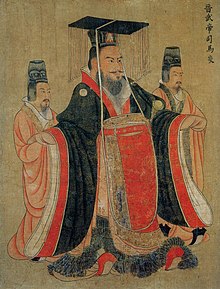This article needs additional citations for verification. (August 2009) |
| Emperor Wu of Jin 晉武帝 | |||||||||||||
|---|---|---|---|---|---|---|---|---|---|---|---|---|---|
 Tang dynasty portrait of Emperor Wu by Yan Liben | |||||||||||||
| Emperor of the Jin Dynasty | |||||||||||||
| Reign | 8 February 266[1] – 16 May 290 | ||||||||||||
| Successor | Emperor Hui | ||||||||||||
| King of Jin (晉王) | |||||||||||||
| Tenure | 7 September[2] 265 – 8 February 266 | ||||||||||||
| Predecessor | Sima Zhao | ||||||||||||
| Regent of Cao Wei | |||||||||||||
| Tenure | 7 September 265 – 8 February 266 | ||||||||||||
| Predecessor | Sima Zhao | ||||||||||||
| Born | 236 | ||||||||||||
| Died | 16 May 290 (aged 53–54)[3] | ||||||||||||
| Consorts | Empress Wuyuan Empress Wudao Empress Dowager Wuhuai | ||||||||||||
| Issue | Emperor Hui Sima Jian Sima Wei Sima Yun Sima Yan Sima Xia Sima Yi Sima Ying Sima Yan Emperor Huai Princess Changshan Princess Pingyang Princess Xinfeng Princess Yangping Princess Wu'an Princess Fanchang Princess Xiangcheng Princess Xingyang Princess Xingyang Princess Yingchuan Princess Guangping Princess Lingshou | ||||||||||||
| |||||||||||||
| Father | Sima Zhao | ||||||||||||
| Mother | Empress Wenming | ||||||||||||
Emperor Wu of Jin (simplified Chinese: 晋武帝; traditional Chinese: 晉武帝; pinyin: Jìn Wǔ Dì; Wade–Giles: Chin Wu-Ti; 236 – 16 May 290[4]), personal name Sima Yan (Chinese: 司馬炎; pinyin: Sīmǎ Yán), courtesy name Anshi (安世), was a grandson of Sima Yi, nephew of Sima Shi and son of Sima Zhao. He became the first emperor of the Jin dynasty after forcing Cao Huan, last emperor of the state of Cao Wei, to abdicate to him. He reigned from 266 to 290, and after conquering the state of Eastern Wu in 280, was the emperor of a reunified China. Emperor Wu was also known for his extravagance and sensuality, especially after the unification of China; legends boasted of his incredible potency among ten thousand concubines.
Emperor Wu was commonly viewed as generous and kind, but also wasteful. His generosity and kindness undermined his rule, as he became overly tolerant of the noble families' (世族 or 士族, a political/bureaucratic landlord class from Eastern Han to Tang dynasty) corruption and wastefulness, which drained the people's resources. Further, when Emperor Wu established the Jin Dynasty, he was concerned about his regime's stability, and, believing that the predecessor state, Cao Wei, had been doomed by its failures to empower the princes of the imperial clan, he greatly empowered his uncles, his cousins, and his sons with authority, including independent military authority. This ironically led to the destabilization of the Western Jin, as the princes engaged in an internecine struggle known as the War of the Eight Princes soon after his death, and then the "Five Barbarians" uprisings that destroyed the Western Jin and forced its successor, Eastern Jin, to relocate to the region south of the Huai River.
- ^ bingyin day of the 12th month of the 1st year of the Taishi era
- ^
SGZ has: "On the day renchen (September 7), the Crown Prince of Jin, Sima Yan, succeeded to his enfeoffment and inherited his rank; he assumed the Presidency of the myriad officials and had gifts and documents of appointments conferred upon him, all in conformity with ancient institutions". Chronicles of the Three Kingdoms, Achilles Fang.
- ^ Fang Xuanling et al. Book of Jin, Volume 3, Biography of Emperor Wu
- ^ According to Sima Yan's biography in Book of Jin, he died aged 55 (by East Asian reckoning) on the jiyou day of the 4th month of the 1st year of the Taixi era of his reign. This corresponds to 16 May 290 on the proleptic Gregorian calendar. By calculation, his birth year should be 236. ([太熙元年四月]己酉,帝崩于含章殿,时年五十五...) Jin Shu, vol. 03